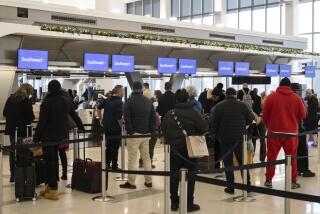FAA Vows to Take Steps to Reduce Traffic Delays
WASHINGTON â The Federal Aviation Administration agreed Thursday to take a series of steps to reduce air traffic control delays that the airlines contend cost them billions of dollars a year.
In particular, the FAA said it would strengthen the decision-making authority of the FAA Command Center in Herndon, Va., allowing it to assert more authority over various air traffic control centers around the country.
Jack Ryan, the Air Transport Assn.âs vice president for air traffic management, said decision-making power is now divided between the command center and the local centers, and decisions often take too long as discussions and disagreements drag on. âSomeone needs to exert control,â Ryan said.
The command center, once called âflow control,â coordinates the movement of aircraft across the country. If weather or some operational problem, such as a closed runway, limits the ability of an airport or a region to handle its normal air traffic flow, the center can take various actions to reduce the number of planes in the sky. That can include holding planes on the ground.
Ryan said the airlines await details on exactly how the command center will be given more power. FAA officials decided to take action after meetings with the Air Transport Assn. and another airline trade group, the Regional Airline Assn.
The FAA also agreed to limit the use of special restrictions that lengthen spacing between aircraft in flight. These âmiles in trailâ restrictions are often used in bad weather as a safety measure, but they also reduce the number of planes that can use the national airspace.
Airlines have complained that miles-in-trail restrictions are overused and excessive. The FAA also agreed to review the conditions under which it orders âground stopsâ--holding airplanes on the ground if weather or other conditions could prevent them from landing immediately at their destination.
More to Read
Inside the business of entertainment
The Wide Shot brings you news, analysis and insights on everything from streaming wars to production â and what it all means for the future.
You may occasionally receive promotional content from the Los Angeles Times.










